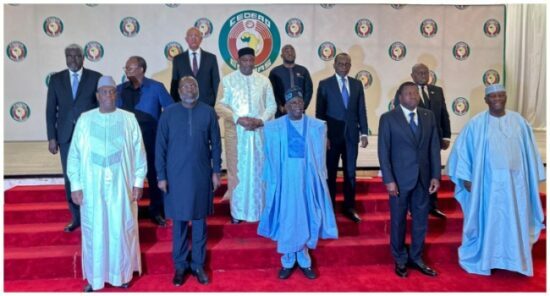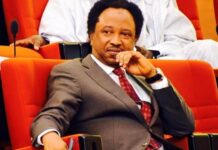Dignitaries from across West Africa have convened in Abuja for the 65th Ordinary Summit of the Economic Community of West African States (ECOWAS). The summit, held at the State House Conference Centre, marks a crucial moment for the regional bloc as leaders deliberate on key issues affecting the subcontinent.

Key Agendas
ECOWAS leaders are discussing strategies to enhance security and combat terrorism within the region. The establishment of a well-funded standby force is critical to responding swiftly to security threats. The summit aims to address the challenge of political instability caused by unconstitutional changes of government. By fostering dialogue and cooperation,
ECOWAS seeks to prevent such disruptions and maintain democratic governance. Despite their initial intention to exit the bloc, ECOWAS has kept seats for leaders of Niger, Mali, and Burkina Faso at the summit. These countries are yet to fully return to ECOWAS following the lifting of the ban on them. Ensuring their reintegration is essential for regional cohesion.
Leadership Transition
President Bola Tinubu, whose one-year tenure as chairman is ending, opened the meeting with gratitude for the support he received during his leadership. As the summit progresses, a new chairperson will emerge to guide ECOWAS through the challenges and opportunities of the coming year.
Welcoming Senegal’s President
In a historic moment, President Bassirou Diomaye Faye of Senegal attends the summit for the first time since his inauguration in April. His presence underscores the importance of collaboration among ECOWAS member states.
Impact on Trade
The ECOWAS summit plays a crucial role in shaping regional trade within West Africa. Leaders discuss measures to simplify cross-border trade, reduce bureaucracy, and enhance customs procedures. Streamlined processes can boost trade efficiency and encourage investment. Investment in infrastructure—such as roads, ports, and railways—improves connectivity and facilitates the movement of goods..
ECOWAS leaders explore funding mechanisms for critical infrastructure projects. Standardizing regulations and product quality across member states promotes intra-regional trade. The summit addresses harmonization efforts to create a level playing field for businesses. ECOWAS leaders negotiate trade agreements with other regions and blocs.
These agreements can open new markets, increase exports, and attract foreign investment. Political stability is essential for trade. By addressing conflicts and promoting peaceful relations, the summit indirectly supports a conducive environment for business.
Trade Challenges
West Africa faces several trade challenges that impact economic activity and regional integration. The cost of moving goods across borders is often prohibitive due to inadequate infrastructure, inefficient logistics, and bureaucratic hurdles. Insufficient road networks and infrastructure hinder the smooth flow of goods within the region.
Language barriers can complicate communication, documentation, and negotiations, affecting cross-border trade. Political uncertainties, conflicts, and changes in government can disrupt trade flows. Security challenges, including piracy, terrorism, and banditry, impact transportation routes and discourage investment. Bribery, extortion, and harassment at border crossings create additional costs for traders. A significant portion of trade in West Africa occurs informally, bypassing formal channels.
Initiatives by ECOWAS
ECOWAS recognizes the rise in conflicts and insecurity across several member countries. To combat this, collective efforts are crucial. The bloc collaborates on security intelligence sharing, joint military operations, and peacekeeping missions. Strengthening regional security institutions and promoting dialogue among member states are ongoing initiatives..
A World Bank report highlighted that despite the potential for local food production, many West African countries still rely on food imports. ECOWAS leaders are actively identifying ways to boost local production, reduce unemployment, and enhance economic growth. Encouraging intra-regional trade and supporting local industries are part of this effort.
ECOWAS aims to improve trade integration by addressing barriers. The Regional Trade Facilitation Committee (RTFC) discusses eliminating non-tariff barriers (NTBs) and enhancing transport facilitation. Initiatives like the Improved and Facilitated Trade in West Africa Project focus on transit trade along major corridors..
ECOWAS is creating a Common Investment Market, promoting investment climate, and integrating financial markets. The ECOWAS Investment Forum and online resources for monitoring investment climate support these policies. By implementing these measures, ECOWAS strives to restore stability, foster economic development, and enhance regional cooperation in West Africa.




